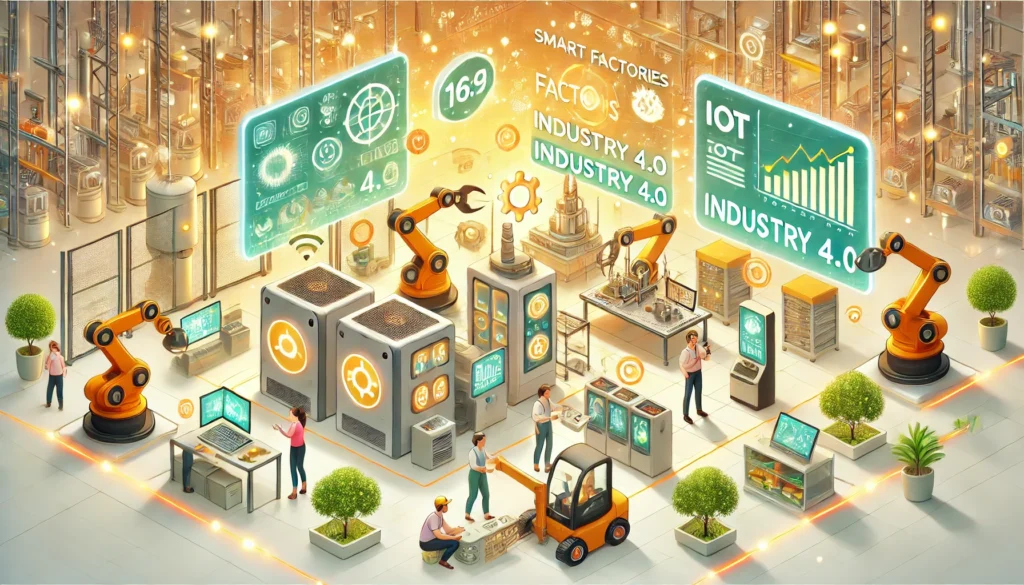
Interim CIO: Dr. Claus Michael Sattler
Smart Factories and Industry 4.0: How companies benefit from new technologies

The fourth industrial revolution is in full swing, and smart factories and Industry 4.0 are at the heart of this transformation. Companies around the world are increasingly recognizing the benefits that these new technologies can offer. Let’s take a closer look at how companies are benefiting from these innovations and what specific use cases already exist.
The basics of smart factories and Industry 4.0
Smart factories are state-of-the-art production environments that are characterized by self-organization and flexibility [source: 1]. They use advanced technologies such as automation, the Industrial Internet of Things (IIoT), artificial intelligence and big data to optimize production processes and respond to changing market conditions.
In the context of Industry 4.0, smart factories go one step further. They not only network the production facilities within a factory, but also create connections to suppliers, customers and other locations [source: 5]. This enables holistic optimization of the entire value chain.
Concrete advantages for companies
The implementation of smart factories and Industry 4.0 technologies offers companies numerous advantages:
- Increased efficiency: By automating and optimizing processes, companies can significantly increase their productivity [source: 1].
- Flexibility: Smart factories can react quickly to changes in demand or in supply chains [source: 3].
- Cost savings: Optimized processes and predictive maintenance lead to lower operating costs [source: 6].
- Quality improvement: Real-time monitoring and analysis enable continuous quality control and improvement [source: 2].
- Individualization: Flexible production enables the cost-effective manufacture of individualized products [source: 5].
- Sustainability: By using resources more efficiently and reducing waste, companies can reduce their environmental impact [source: 1].
Use cases and success stories
Let’s look at some specific examples of how companies are successfully using smart factories and Industry 4.0 technologies:
Predictive maintenance in logistics
TVH, a leading global supplier of industrial vehicles such as forklifts, implemented a predictive maintenance system in 2017 using IoT-enabled devices [source: 6]. This enabled remote diagnosis and categorization of repair events, leading to optimization of technician scheduling and spare parts management. As a result, TVH was able to reduce maintenance costs by 30% and significantly increase machine uptime.
Digital central management in semiconductor production
A semiconductor manufacturer implemented the WISE iFactory solution to enable centralized digital management of its production facilities [source: 2]. This led to an accelerated convergence of OT (Operational Technology) and IT (Information Technology), an enrichment of industrial applications and a reduction in total cost of ownership. At the same time, the sustainability and scalability of production was improved.
Automated quality control in the automotive industry
An automotive supplier relied on a smart factory solution for automated testing and visual inspection of workstations [source: 2]. This prevented product defects, reduced manual errors and increased efficiency. The changeover led to improved production quality, accelerated inspection speeds and minimized downtime at the testing and inspection stations.
Intelligent monitoring in HVAC production
A manufacturer of heating, ventilation and air conditioning systems implemented a smart monitoring solution that enabled data collection and real-time visualization for intelligent equipment monitoring and management [source: 2]. The solution proved to be space-saving, sustainable and relatively cost-effective for monitoring HVAC manufacturing and installation.
Smart Factory in the tobacco industry
A tobacco manufacturer used a smart factory solution to implement a complete data capture system across different generations of machines [source: 2]. The solution enabled the company to meet barcode requirements for all products and comply with government regulations. At the same time, the modularity and flexibility of the products allowed the manufacturer to minimize the hardware footprint and maximize production efficiency.
Challenges and solutions
Despite the many benefits, companies face a number of challenges when implementing smart factories and Industry 4.0 technologies:
- High investment costs: Switching to smart factory technologies often requires considerable initial investment [source: 3].
- Complexity: The multitude of systems, protocols and standards can be overwhelming [source: 8].
- Data security: As networking increases, so do the security risks [source: 3].
- Employee qualifications: New technologies often require new skills and abilities [source: 3].
To overcome these challenges, companies can pursue the following approaches:
- Step-by-step implementation: A step-by-step approach to the introduction of Industry 4.0 technologies can minimize risks and spread investments over time [source: 8].
- Focus on use cases: The development of concrete use cases helps companies to recognize and implement the practical benefits of smart factories and Industry 4.0 [source: 2].
- Investing in cyber security: Robust security concepts must be an integral part of every smart factory solution [source: 3].
- Continuous training: Training and further education programs help employees to keep pace with new technologies [source: 3].
Outlook: The future of smart factories and Industry 4.0
The development of smart factories and Industry 4.0 is progressing steadily. Future trends include:
- Increased AI integration: Artificial intelligence will play an increasingly important role in decision-making and process optimization [source: 1].
- Augmented reality (AR) and virtual reality (VR): These technologies will be increasingly used for training, maintenance and design [source: 2].
- 5G networks: The introduction of 5G will further improve real-time communication and data transmission [source: 5].
- Sustainable production: Smart factory technologies are increasingly being used to promote resource efficiency and sustainability [source: 1].
Smart factories and Industry 4.0 represent a fundamental change in the way companies produce and create value. They offer enormous opportunities for efficiency gains, cost savings and innovation. Companies that successfully implement these technologies will be able to strengthen their competitiveness and position themselves for the future of production.
Sources
- https://refa.de/service/refa-lexikon/smart-factory
- https://www.advantech.com/en/resources/case-study/explore-success-stories-for-smart-manufacturing
- https://www.applus-erp.de/wissen/erp-technologie/blog-anwendungsbereiche-industrie-40-erp/
- https://www.industrial-devops.org/en/the-smart-factory-and-the-internet-of-things-an-industry-4-0-case-study/
- https://www.sew-eurodrive.de/automatisierung/anlagenautomatisierung/smarte-fabrik/smarte-fabrik.html
- https://www.rtinsights.com/3-smart-manufacturing-use-cases-that-improve-production/
- https://www.infineon.com/cms/de/discoveries/industrie-4.0-smart-factory/
- https://kem.industrie.de/digitalisierung/was-unterscheidet-digitalisierung-smart-factory-und-industrie-4-0/
- Image: ChatGPT